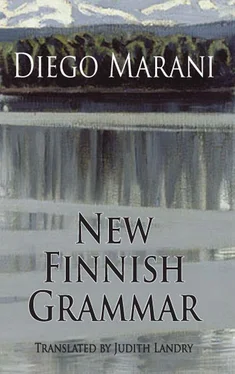Accompanied by a nurse, I had begun to venture out on deck for the occasional short stroll, walking the length of the ship, holding on to the taffrail. Once I had reached the stern, I would sit down in the sun, facing the blue sea which for so long I had glimpsed only from the porthole. Later, I would learn that I was on board the German hospital ship Tübingen, riding at anchor off the Italian port of Trieste, waiting to unload its cargo of wounded so that they could be transferred on to Red Cross trains headed for Germany. On sunny mornings the distant city, dotted with green domes, seemed to be set upon rows of glittering waves, and I took pleasure just sitting and gazing at it. I felt reassured by that expanse of limpid water, that ordered countryside. On deck I also met other soldiers, thin-faced men with an absent air about them. All had some bandaged limb or were more or less obviously maimed. Some dragged themselves along leaning on makeshift crutches, which they still handled clumsily. Others seemed physically unimpaired, but on closer inspection turned out to have a bewildered look that was scarcely human. They gathered together in small groups, on the more sheltered benches, playing cards, chatting, or staring wordlessly into the distance, taking the odd puff of a cigarette. I tended to steer clear of them, since I myself had nothing to contribute. But when I caught some snatch of conversation I would eavesdrop, trying to make sense of the words I heard them utter. I would single out those I could hear most clearly, those they seemed to pronounce most often, and move away in order to repeat them aloud to myself. But those unknown sounds would echo emptily in my mouth and head without leaving anything behind, like an echo dying away gradually. At an unconscious level I felt that they were not those that figured in the language spoken by Doctor Friari. Even when I did succeed in reproducing them, they would melt away like bubbles without my being able to gain the knack of repeating them. I would go back to sitting alone, looking out to sea. But not even that majestic sight could calm my sense of dread. My gaze bore into the distance in the desperate hope of finding some foothold, some memory, some image which might miraculously bring the vanished part of me back to life.
Each morning after my walk, I would go to Doctor Friari for my daily session. Petri Friari — a neurologist at the university hospital in Hamburg — was a German citizen, but originally from Finland. As I was later to learn, he had fled his native land many years earlier, when he was little more than a boy. At first I had difficulty understanding his story, even though he had told it me on several occasions, aided by that same map of Europe and every gesture he could think of. It was not clear to me why he had left, but I sensed that his departure had tragic overtones. But, as I gained in understanding, as words proliferated in my mind, I managed to piece his tale together.
During the years when Russia was being riven by revolution, Finland too was caught up in the maelstrom. Workers in the industrial centres rebelled, took up arms and set up a communist government. The country split into two and civil war broke out, with the white armies commanded by Marshal Mannerheim emerging victorious after a long struggle. Once order had been restored, mercilessly repressive measures were taken against those who had sympathized with the Bolshevik cause. Doctor Friari’s father, a university professor with socialist leanings, was arrested and sent to a prison camp. After the terrible winter of 1918, no more was heard of him. So Petri Friari, then a young medical student, had left Finland with his mother to seek refuge in Hamburg, to stay with distant German relatives. There, in order to survive, he had become a jack-of-all-trades, making huge sacrifices in order to complete his studies. He had not been back to his country since the age of twenty-three. But he had never forgotten his language; nor his people.
Backed up against the railway, blackened by smoke, the Gothic building of the Finnish sailors’ church stands just outside the port of Hamburg, where the cranes thin out and the city dwindles away into grey countryside. There the doctor would meet up with fellow-Finns who had arrived by merchant ship; they would tell him the latest news, bringing him letters and newspapers. Every Sunday he would accompany his mother to mass, and spend some hours in the afternoon doing charitable work for the city’s small Finnish community, whose members he would treat free of charge. In exchange he received warmth, affection and the occasional bottle of spirits, but above all the opportunity to speak his language, and it was this that he most welcomed. This was why Doctor Friari had taken such an interest in my case: the name embroidered on the label in my jacket was a Finnish name, and perhaps he saw my wretched situation as mirroring his own. I too had been unceremoniously flung out of my own country, and the language which the doctor believed to be buried somewhere in my damaged brain was also his. He cared for me and my wounds in the same spirit as he had tended to the sailors who frequented the church in Hamburg. During our sessions he would tell me about his past as though it were some sad tale whose ending he did not know himself, but which he enjoyed telling me, as though to ward off further misfortune. Welcoming me into his office, he would rub his hands as though in anticipation of some pleasant diversion. He would sit down and open his green notebook, which he constantly consulted as he told his tale, or questioned me.
Then he would show me pictures, different on each occasion, which were glued into his notebook or taken from some other book, and put names to them, asking me to repeat what he had said. The words he used were different from those I heard spoken by the soldiers on deck; at first I had difficulty pronouncing them; certain vowels I found particularly hard. But the doctor was wonderfully persevering. Later he told me that he himself was surprised at how fast I learned. A light dusting, a sprinkling of sounds had gradually settled on the smooth rock of my mind, becoming denser and more full-bodied over time. A rich, deep humus had formed, where words were now taking root and thriving. The linguistic memory which my injury had uprooted from my brain was being born afresh in another part of my mind, bolstered by reason but at the same time as spontaneous as a natural language. That was how the doctor put it, and indeed he was amazed that I could learn so quickly, drawing on mental resources which he had thought to be unsuited to the learning of a language. Secretly hoping to believe his own optimistic words, he ventured the fantastical hypothesis that my brain cells had tracked down the remnants of my language which lay scattered among the folds of my wound, and that the effort of learning had caused them gradually slowly to reknit, to take on shape and consistency. Some unknown chemistry was at work within me, new capillaries were branching out, bringing their juices to unexplored regions previously known only to the animal life of blood and flesh.
As he observed it, the doctor referred to this phenomenon as miraculous, and he took the greatest pleasure in all the stages of my progress. He noted down my reactions to his exercises in the greatest detail, together with the new words I was learning to use. He regarded my recovery as a personal triumph, a great step forward for science. But what he found most moving of all was the retrieval of a language which, in his own way, he too had kept safe within himself, ferrying it from exile into the seas of memory. Even though we could not engage in sophisticated conversation, and our dialogue consisted of single words, repeated to the point that they seemed almost to take on bodily form around us in the air, Doctor Friari felt that in some abstract way we both belonged to the same world. We were bound together by some mysterious link, some bond which was not to do with blood, but which resonated in the sound of language. In the doctor it revived the sweetness of memory, and in me it aroused the will to live.
Читать дальше












